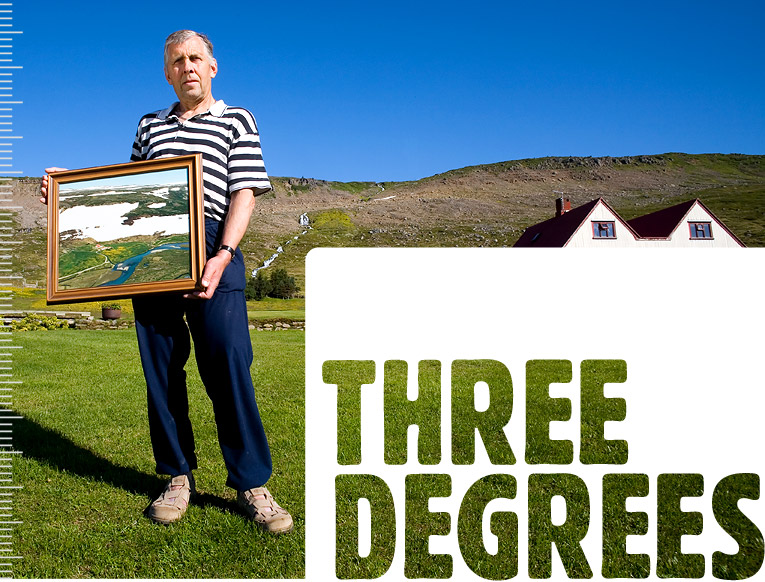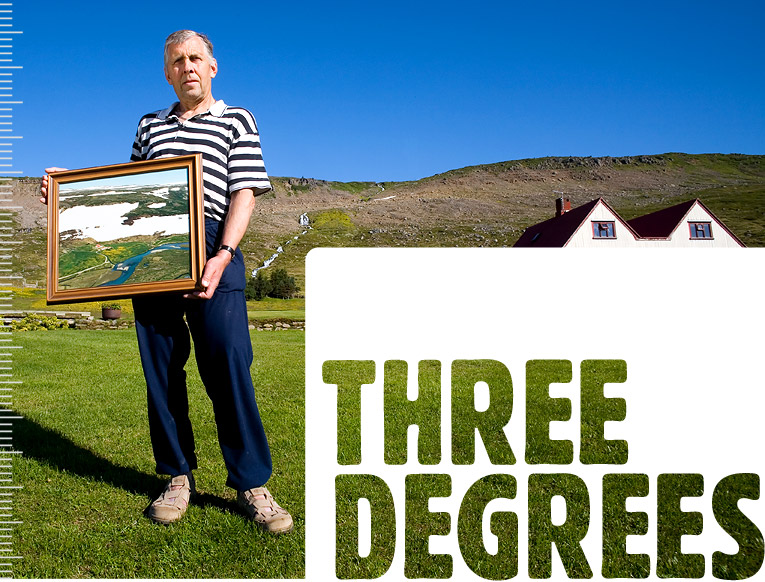 Courtesy of Three DegreesI’m spending this Thursday and Friday at the Three Degrees conference on climate change and human rights, hosted by the University of Washington School of Law. Some 40 speakers—mostly legal scholars, but also public health experts, NGO leaders, trial lawyers, and political organizers—are gathered to debate the future of the law as it applies to victims of climate change. The first day was thought-provoking, sobering, and occasionally bewildering. Oddly enough, the biggest moment of clarity for me was a story one of the speakers told about another conference.
Courtesy of Three DegreesI’m spending this Thursday and Friday at the Three Degrees conference on climate change and human rights, hosted by the University of Washington School of Law. Some 40 speakers—mostly legal scholars, but also public health experts, NGO leaders, trial lawyers, and political organizers—are gathered to debate the future of the law as it applies to victims of climate change. The first day was thought-provoking, sobering, and occasionally bewildering. Oddly enough, the biggest moment of clarity for me was a story one of the speakers told about another conference.
Mary Robinson—former president of Ireland, former United Nations High Commissioner for Human Rights, and a generally with-it public leader on climate change—spoke about attending climate talks in Bonn, Germany, in March. Young activists there wore t-shirts with the question, “How old will you be in 2050?” International delegates, said Robinson, realized there was something to the message and asked for t-shirts of their own.
OK, it’s not much of a zen moment, but something about the personal nature of the question—“How old will you be…”—carries more intimacy than a broad, sweeping slogan. Something about posing it as a question carries more weight than a statement. Something about leaving climate change’s countless uncertain, messy, and mundane implications packed up for the moment—there’s more punch to it that way.
I suppose there’s a place for unpacking what’s going to change, and the speakers at Three Degrees did a lot of that. Robinson, in a lively talk, said human migration is likely to be “the single greatest impact” of a changing global climate. She said 150 million people are expected to be displaced by 2050, driven by a combination of desertification, water scarcity, and fiercer storms and floods.
She laid out a vision of “climate justice” as an orientation that keeps human rights at the forefront of climate work. To her, that involves acknowledging that people are already suffering because of climate change, listening to under-heard voices, and taking “responsibility for our past as well as our current emissions.”
“We must stop pointing fingers,” she said. “Blaming China, for example, for having a large population and being a poor country that wants to develop. That’s not going to produce meaningful progress.”
Robinson’s talk was timely, given today’s release of a new humanitarian report on the human toll of climate change. The Global Humanitarian Forum, a group created by former UN chief Kofi Annan, says global warming is killing 300,000 people a year, a number expected to rise to 500,000 by 2030. Also timely, the New York Times reports that the International Migration Organization is predicting growing numbers of climate refugees (PDF).
Aside from Robinson’s keynote, there were other highlights:
* An argument that future generations should have guardians in the legal system today, from Carolyn Raffensperger of the Science and Environmental Health Network in Ames, Iowa. There’s plenty of precedent for this, she said. Children who need representation in court are appointed guardians ad litem. Small businesses have their own ombudsman in the Department of Justice. For seven years, Israel had a Commission for Future Generations. Raffensperger suggested UW become the nation’s first law school to develop a certificate program for such guardians.
“Future generations cannot speak for themselves, but we can appoint guardians for them,” she said.
* Blunt assessment of the current legal system. “Our system is embarrassingly and unacceptably inaccessible” to those who need it most, said Bill Neukom, immediate past president of the American Bar Association. He led a panel that roundly agreed existing law isn’t up to the task of addressing climate change effects. Steve Berman, a trial lawyer who worked with the Exxon Valdez oil spill, gave an update from the Kivalina case, a suit against 24 oil, coal, and power companies by an Alaskan village under threat from climate change-driven coastal erosion.
The village, with Berman’s representation, filed not just a public nuisance claim but also a conspiracy claim, alleging the companies actively concealed information to avoid having to change their behavior. He likened it to a successful suit against tobacco companies who worked to conceal the health risks of using tobacco.
“Our claim is that they avoided regulation, they avoided being called on to reduce emissions, by creating the fiction that there was a debate in the scientific community,” said Berman, managing partner at the Seattle firm Hagens Berman Sobol Shapiro.
The case is awaiting a decision from a federal judge in California. If the defendents’ motions to dismiss are denied, it would the first case of its kind to make it to that point.
* Finally, on a completely different note, my biggest mistake of the day might have been arriving too late to hear the morning performance of Climbing Poetree, a spoken-word/artists-of-many-stripes duo. They were listed as “conference inspiration,” which I figured was an oxymoron. But I’m told they floored the 200 or so attendees. You just don’t hear many stories of people moved to tears at law school conferences.



